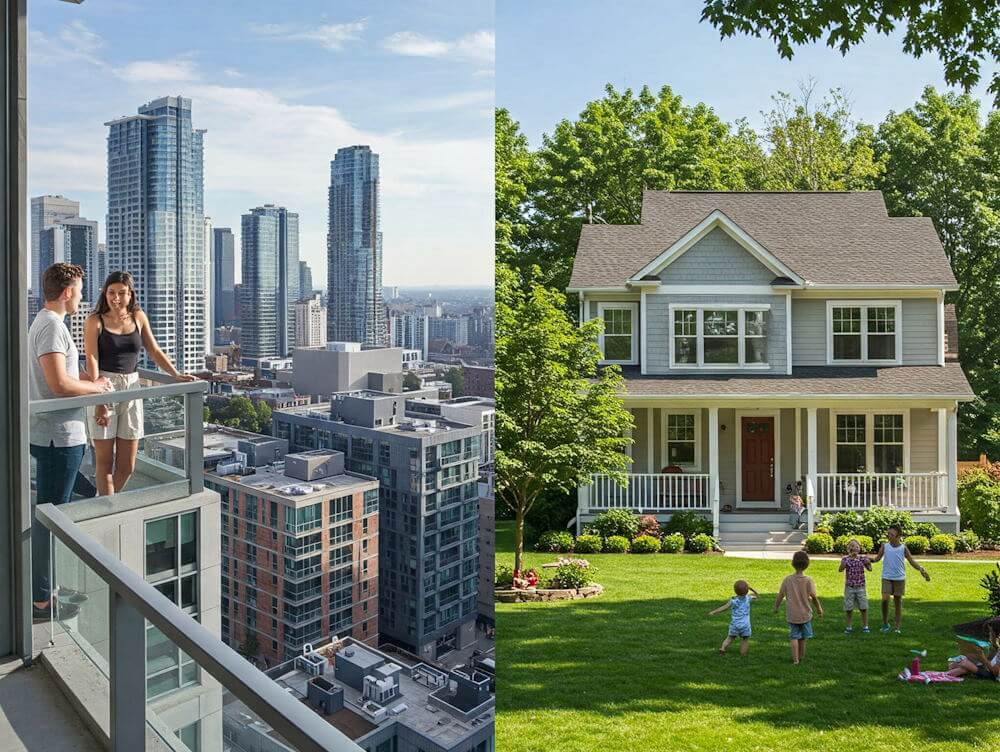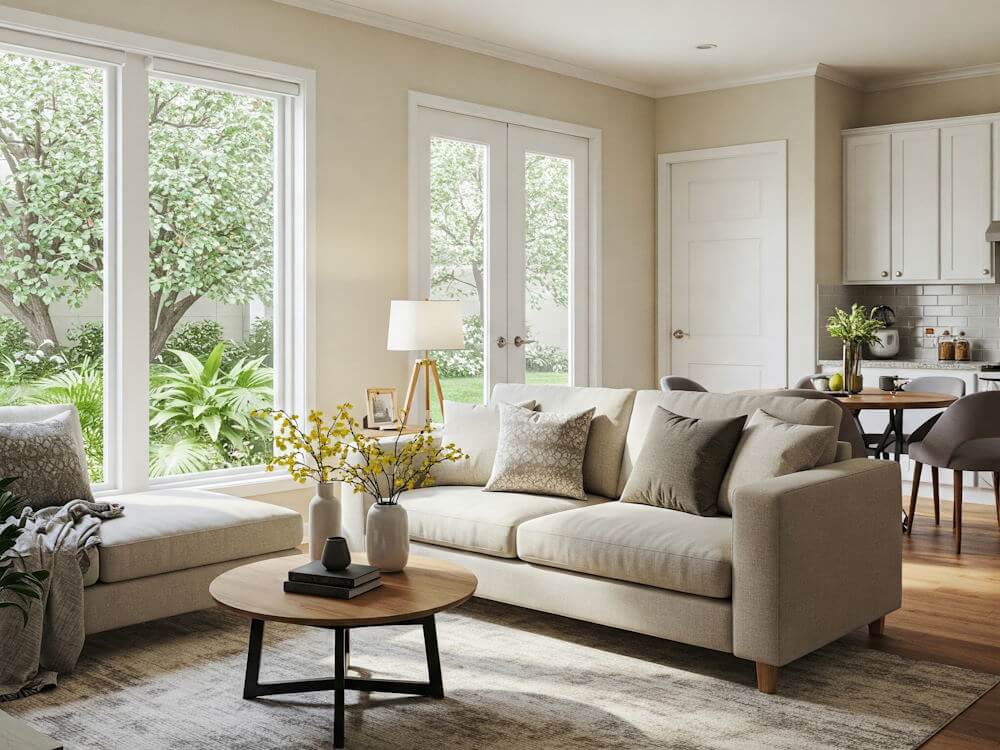Introduction to Homeownership Options
When it comes to homeownership, potential buyers often find themselves at a crossroads, primarily deciding between two main types of properties: condominiums and single-family houses. Each option presents distinct advantages and challenges that can significantly impact not only the quality of living but also the financial aspects involved. Understanding these differences is pivotal for prospective homeowners, as it lays the groundwork for informed decision-making in relation to their housing needs.
Condominiums, commonly referred to as condos, are typically units within a larger building or community, offering shared amenities and communal spaces. This arrangement often appeals to individuals seeking a low-maintenance lifestyle paired with access to conveniences like gyms, pools, or social gathering areas. Conversely, a single-family house provides an entirely different experience—complete ownership over a standalone structure, along with a yard and additional space both indoors and outdoors. This often attracts families and individuals desiring privacy, personal customization, and a larger living area.
As with any decision in life, particularly one as significant as purchasing a home, weighing the pros and cons of each option is critical. For instance, while condos might lead to lower upkeep costs and potentially more affordable pricing in urban areas, they also typically come with homeowners association (HOA) fees that can accumulate over time. On the other hand, a house may entail higher initial investment and maintenance responsibilities, yet it also provides more autonomy and flexibility to its owners.
In the following sections, we will explore the various pros and cons associated with each type of homeownership in depth. Such comparisons will aid those navigating these important choices, helping to highlight key considerations that may facilitate a more aligned choice with their lifestyle preferences and financial goals.
Understanding Condos: What to Know
Condominiums, commonly known as condos, are a popular form of housing that typically offer a unique blend of ownership and communal living. Unlike traditional single-family homes, condos are individual units within a larger building or development. Each owner holds title to their specific unit while sharing ownership of common areas, such as hallways, recreational facilities, and outdoor spaces, with fellow residents.
One of the defining features of condo living is the concept of community. Residents benefit from amenities that may include swimming pools, fitness centers, and landscaped gardens, which contribute to a well-maintained atmosphere. These communal facilities are often a significant draw for many potential buyers, as they provide conveniences that may not be easily accessible in standalone homes. However, access to these amenities typically comes with the responsibility of paying homeowner association (HOA) fees. These fees are crucial for the maintenance and management of shared spaces and are required of all condo residents.
It’s important to understand that living in a condo entails adhering to specific rules established by the HOA, which governs the community. These regulations can dictate everything from noise levels to the types of renovations allowed within individual units. While such guidelines can enhance community living and uphold property values, some individuals may find them restrictive compared to owning a house where owners have more autonomy over their property.
Overall, experiencing condo living can offer a variety of benefits, especially for those seeking a low-maintenance lifestyle in an organized community. Before deciding on a condo as a housing option, potential buyers should thoroughly research the specific development, its amenities, and the associated fees and rules to ensure it aligns with their personal preferences and lifestyle needs.
Exploring Houses: Key Features
Standalone houses, commonly referred to as single-family homes, are characterized by their independence and autonomy. These residential structures are typically situated on individual lots, providing homeowners with direct ownership of both the dwelling and the property itself. One significant feature of owning a house is the layout flexibility, which allows for diverse architectural designs, ranging from bungalows to sprawling estates. Homeowners can choose from various floor plans that best suit their lifestyle, preferences, and family dynamics.
In contrast to condominiums or townhouses, standalone houses often boast larger living spaces, including multiple bedrooms, bathrooms, and a full kitchen. This spaciousness can cater to families or individuals seeking ample room for personal development and comfort. Additionally, many houses feature dedicated outdoor areas, such as gardens, patios, or yards, allowing for a connection to nature and opportunities for recreational activities. This potential for outdoor space is a key selling point for those who prioritize gardening, entertaining, or simply enjoying a private retreat.
Ownership of a house also grants individuals a greater degree of freedom when it comes to renovations and personalizing the living environment. Unlike condominiums, where homeowners may be subject to homeowners association (HOA) rules and regulations, house owners generally have the autonomy to make changes to their property without external approval. This flexibility can include renovations, landscaping, or even building additional structures on the property, imparting a sense of ownership and pride in one’s living space.
However, prospective homeowners should also consider that owning a house typically entails more responsibilities, including maintenance, property taxes, and insurance costs. Although the autonomy and freedom associated with standalone houses can be appealing, it is essential to balance these advantages against the broader scope of homeownership obligations and the potential for increased financial commitment.
Advantages of Purchasing a Condo
Buying a condo presents numerous advantages that can significantly enhance the living experience for many individuals, particularly in urban settings. One of the most appealing aspects of condo ownership is the reduced maintenance responsibilities. Unlike single-family homes, where homeowners must manage extensive lawn care, roof repairs, and exterior upkeep, condo owners often enjoy the luxury of outsourcing these tasks to the homeowners’ association (HOA). This arrangement allows residents to spend more time enjoying their homes and less time addressing maintenance issues.
Additionally, many condos offer access to a variety of amenities that can enhance quality of life. Common features include swimming pools, fitness centers, and community lounges. Such amenities not only provide recreational opportunities but also foster a sense of community among residents. In many cases, these facilities can rival the offerings of private fitness centers or leisure clubs, allowing condo owners to save both time and membership fees.
The financial dynamics of purchasing a condo can also be favorable. Condos are generally available at a lower price point compared to single-family houses, especially in densely populated urban areas. This can make homeownership more accessible for first-time buyers, young professionals, and retirees looking to downsize. The lower initial investment can allow owners to allocate funds toward renovations, investments, or savings, presenting additional financial flexibility.
Moreover, condo living often appeals to specific lifestyles. Those seeking a close-knit community or preferring a low-density living arrangement may find a condo environment more suitable than a traditional house. This communal living arrangement can cater to individuals who value social interactions and shared experiences, contributing positively to their overall sense of belonging. As a result, choosing to buy a condo can align with personal goals and preferences, making it a viable housing option for many.
Cons of Buying a Condo
While purchasing a condo can be an appealing option for many prospective homeowners, it is essential to consider the potential disadvantages that accompany this type of property. One significant drawback is the mandatory Homeowners Association (HOA) fees. These fees can vary widely based on the condo’s location and amenities but can often represent a considerable monthly expense. Homeowners may find that these costs increase over time, impacting their overall budget and financial planning.
Additionally, living in a condo often comes with several restrictions that can limit the homeowner’s autonomy. Many homeowner associations enforce rules regarding renovations, modifications, and even rental agreements. For instance, some associations may prohibit owners from making structural changes, installing certain types of flooring, or making modifications to outdoor spaces. This lack of freedom can be frustrating for those who value customization and personal expression within their living spaces.
Privacy can also be a concern for condo owners. Since condos are typically part of a shared building structure, noise from neighboring units can be a significant factor. This shared living arrangement may result in less privacy compared to a standalone home, where the homeowner has more control over their living environment. Furthermore, interaction with neighbors is inevitable; while it fosters a sense of community, it can also lead to potential conflicts if differing lifestyles clash.
Living in a shared community can also influence lifestyle decisions. For example, strict rules regarding noise levels, common area usage, and pet ownership can affect the day-to-day activities of residents. In a community, the need to comply with collective regulations might limit personal preferences and choices in ways that standalone homeownership would not. Overall, prospective buyers must weigh these cons carefully before deciding whether purchasing a condo aligns with their lifestyle and long-term goals.
Pros of Buying a House
Owning a house presents several advantages that appeal to many potential homeowners. One significant benefit is the increased level of privacy that a house offers compared to other living arrangements, such as condos or apartments. Unlike shared walls in multi-family dwellings, houses typically provide homeowners with private outdoor spaces and minimized noise pollution from neighbors. This autonomy creates a more tranquil living environment and contributes to an enhanced quality of life.
Another compelling reason to purchase a house is the potential for property value appreciation. Over time, real estate often appreciates, offering homeowners a valuable return on investment. Factors such as neighborhood development, local amenities, and market trends can positively influence property values. The equity built over the years may become a powerful financial tool, enabling homeowners to fund future endeavors, such as pursuing further education or expanding their investments.
Homeownership also confers a greater degree of control over personal living spaces. Homeowners are free to customize their properties to best suit their preferences and lifestyle. This flexibility can involve carrying out renovations, landscaping, or even expanding the living space—all without the guidelines and restrictions often imposed by homeowners’ associations (HOAs) prevalent in condo living. As a result, homeowners can create an environment reflective of their tastes and needs.
Moreover, the absence of HOA regulations provides a level of independence that is highly valued by many individuals. Without the constraints of monthly fees and community rules, homeowners can manage their properties as they see fit, fostering a sense of autonomy that enhances the experience of owning a home. Ultimately, buying a house presents numerous advantages, making it an appealing consideration for those seeking stability and personal expression in their living arrangements.
Cons of Buying a House
While purchasing a house can offer numerous benefits, it is essential to consider the potential downsides that come with homeownership. One significant disadvantage is the higher maintenance costs associated with standalone properties. Homeowners are responsible for upkeep, which includes routine tasks such as cleaning gutters, replacing roofs, and maintaining HVAC systems. These expenses can accumulate over time and may become a financial burden for some homeowners, especially if unexpected repairs arise.
In conjunction with maintenance costs, homeowners are also subject to property taxes that can vary based on location and the value of the home. Unlike a condo, where some of these taxes may be bundled into homeowners’ association fees, property taxes for single-family homes require direct payment. This can strain personal finances, particularly if property taxes increase due to rising real estate markets or local government budgets.
Another contributing factor to the challenges of homeownership is the responsibility that comes with yard work and exterior maintenance. While many individuals take pride in their home’s appearance, the time and effort required to maintain a yard—mowing, landscaping, and seasonal preparations—can be burdensome. For those who prefer a low-maintenance lifestyle, the demands of caring for a house can detract from overall enjoyment.
Moreover, homeownership represents a significant financial commitment, often requiring a substantial down payment and long-term mortgage obligations. This type of investment can limit personal flexibility, particularly for individuals who may want to relocate for job opportunities or lifestyle changes. In summary, while buying a house can provide a sense of stability and belonging, it is important to weigh these cons against the benefits before making such a significant decision.
Making the Right Choice: Considerations for Buyers
When weighing the pros and cons of homeownership, particularly between condos and houses, prospective buyers must evaluate several critical factors. The choice between these two types of properties often hinges on location, lifestyle preferences, and individual financial situations. Each element plays a vital role in determining which option aligns better with personal goals and circumstances.
Location is often the primary consideration for many buyers. Condominiums tend to be situated in urban areas, providing convenient access to amenities such as shopping, dining, and entertainment. If proximity to these services is a priority, a condo might be a suitable choice. Conversely, houses are frequently found in suburban or rural areas, offering larger living spaces and greater privacy. Evaluating the desired location will significantly influence the decision-making process.
Personal lifestyle preferences also dictate the suitability of either option. For individuals or families seeking low-maintenance living arrangements, a condo may offer advantages through building management services that handle upkeep and repairs. This can be particularly appealing for busy professionals or those approaching retirement. On the other hand, if a buyer values outdoor space, privacy, or the freedom to customize their property, a house is likely more suitable. An important question to consider is what trade-offs are acceptable to you concerning convenience and personal space.
Lastly, financial considerations cannot be overlooked. Buyers should assess their budget, including mortgage rates, HOA fees associated with condos, property taxes, and maintenance costs related to houses. It’s essential to evaluate how each option fits within your overall financial objectives and lifestyle preferences. By asking yourself these relevant questions, you can make an informed decision that aligns effectively with your long-term homeownership goals.
Market Trends: Condos vs. Houses
The real estate landscape is continually evolving, influenced by a myriad of factors that shape buyer preferences and market dynamics. Currently, the trend for homeownership shows a notable inclination towards both condos and houses, driven largely by changing demographics, economic conditions, and urbanization.
Demographics play a crucial role in determining the type of property buyers are interested in. Younger generations, particularly millennials and Gen Z, are increasingly gravitating towards condominiums. The appeal lies in the relatively lower cost, maintenance amenities, and proximity to urban hotspots that support their active lifestyles. Conversely, as these buyers transition into family-oriented phases of life, there’s a gradual shift towards single-family homes, which provide additional space and privacy.
Economic factors also significantly influence market trends. Interest rates, inflation, and overall economic performance can sway individuals’ decisions when selecting between condos and houses. For instance, during times of economic uncertainty, buyers may opt for condos due to their lower entry price and financial commitments. However, when economic conditions stabilize, more individuals might pursue purchasing single-family homes as an investment grounded in long-term value appreciation.
Urbanization is another pivotal element in the current market trend. As cities expand, the demand for housing in urban areas intensifies. Condominiums, often found in prime urban locations, cater to those seeking convenience alongside accessibility to work, entertainment, and amenities. On the other hand, houses are often situated in suburban settings, which have become attractive to families seeking a balanced lifestyle away from the hustle and bustle of city living.
In summary, the interplay of demographics, economic factors, and urbanization continues to shape the preferences for condos versus houses in today’s real estate market. Understanding these trends is essential for potential homebuyers when considering their options.
Conclusion: Weighing Your Options
Upon examining the various attributes of both condominiums and houses, it becomes evident that each option presents unique advantages and disadvantages that prospective homeowners must carefully consider. The major distinction lies in maintenance responsibilities, space, cost, and community engagement. Condos often appeal to individuals seeking lower maintenance hassles, typically providing shared amenities and community features that can enhance the lifestyle of their residents. Conversely, single-family homes typically offer greater privacy, larger living space, and the potential for yard ownership, catering to families and those desiring more room to grow.
Financial implications also play a crucial role in the decision-making process. While condos may present a more affordable entry point into homeownership, homeowners need to factor in monthly association fees that accompany condo living. These fees can significantly impact overall budgeting and should be weighed against the potential costs associated with maintaining a standalone house. Additionally, house appreciation might differ, and future resale value is an essential aspect to ponder for both options.
Furthermore, lifestyle preferences significantly influence the choice between a condo and a house. Urban dwellers may favor the proximity and convenience of a condo, whereas those wishing for a suburban or rural setting might find a house more appealing. Consideration of personal values, social needs, and future aspirations will ultimately guide prospective buyers toward a decision that aligns with their long-term goals.
In conclusion, the choice between purchasing a condo or a house is a personal journey that requires careful reflection on various factors, including individual lifestyle preferences, financial considerations, and maintenance responsibilities. By thoughtfully weighing these aspects, potential buyers can make an informed decision that best matches their needs and desires for homeownership.




